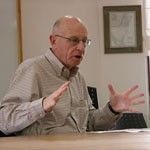By Ira Sharkansky, PhD

JERUSALEM — Israel’s ultra-Orthodox, or Haredi communities are in a state of confusion, or a mess, in the run-up to the November election.
A prominent issue is the requirement to teach a core curriculum, focused on math, English, and Hebrew in the schools. This is required by the Education Ministry, and applied in secular, religious, and Arab schools, but is uneven throughout the independent sector, where the Haredim exist.
The community is divided in two (Ashkenazim and Sephardim), and further divided into communities led by rabbis with traditions going back to pre-Israeli roots in Europe or elsewhere.
Outside of the Haredi sector, the terms Ashkenazim and Sephardim are becoming outdated, with generations of intermarriage and the products labelled “Israeli,” rather than the labels reflecting what existed prior to Israel’s birth.
Over the years the Education Ministry has winked at partial compliance with its requirement. The schools of some Ashkenazi Haredi movements teach math, English, and Hebrew, less than described in the formal requirements, and others teach almost entirely religious matters, dedicating perhaps two hours per week to secular subjects. And all in Yiddish.
What is important is the future of the students. Without math, English, and Hebrew, they are destined for a lifetime of study, supported by the state, and the production of large families whose male children will continue with lives of religious study.
The issue is always present, but now it’s become politicized with Netanyahu’s promise to assure full state support, despite schools that do not accept the requirement of the Education Ministry for a core curriculum.
There are strong differences between the training and professions of Haredi men and women. Women are more likely to enter higher education, and eventually to work. Many of them are in education, and fewer than other Israeli women in high tech and other fields. A small, but increasing incidence of men reach higher education, mostly in the field of education.
What dominates is a wife working and husband studying, with the women also largely responsible for caring for many children.
We’re hearing from ultra-Orthodox women. Some want gender representation in their parties’ Knesset delegation and are chafing at being ignored by the men who rule the Haredi parties.
Currently the Haredi comprise 13 percent of the Israeli population, and their incomes are a bit less than two-thirds that of other Jews. Ultra-Orthodox students at the end of their school program take the matriculation exam only at about one-third the rate of non-ultra-Orthodox students. Projections, reflecting the large birth rate of the ultra-Orthodox, show it comprising close to 25 percent of the Jewish population in 2050.
Divisions, especially among the Ashkenazim, are prominent. Agudat Yisrael is Hasidic, and comprised principally of the Ger, Vizhnitz, and Belz communities. Degel HaTorah is not Hasidic and is said to be composed of Jews originating in Lithuania. Agudat Yisrael and Degel HaTorah have united under the label of United Torah Judaism, but arguments and potential splits are part of their traditions.
One headline pretty much sums up what exists: “Inside Israel’s Closed Off Ultra-Orthodox Communities.”
As outsiders, we don’t know much about what happens inside.
“Leadership” and “unity” are flexible concepts in the Haredi world. The parties are composed of groups led by rabbis, often ancient, who mumble their instructions to younger followers, often relatives, who claim to understand what the sage ordered. Clusters with traditions going back to European roots, as well as the egos of those currently in charge. Although those making the crucial decisions are not always clear.
Discipline is valued among their parties, with the political leaders said to be enthralled to their spiritual leaders.
Confusion, or a mess? Or a disciplined aggregate? Conclusions depend on perspective, as well as affiliation to one of the Haredi clusters, or being a “freethinker.”
*
Ira Sharkansky, PhD, is professor emeritus of political science at Hebrew University. He may be contacted via ira.sharkansky@sdjewishworld.com